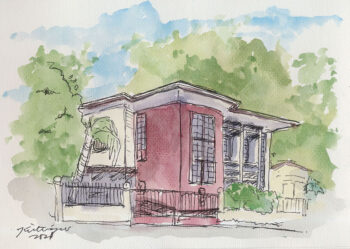CAGAYAN DE ORO CITY (MindaNews / 14 Oct) – Today’s build up practically everywhere of exclusive habitats (subdivisions, townships, and other gated enclaves) reveals with increasing clarity two contrasting faces of development in our basic community, the barangay.
On one hand, an exclusive gated habitat or neighborhood, well-designed and maintained; on the other, the government-administered neighborhood, disorderly, shabby, or chaotic with buzzing slums. Two dissimilar habitats coexisting within the same jurisdiction.
The fenced-in, gated, and guarded part is developed and administered privately, with modern facilities and amenities built to standards. They have a civilized, orderly ambience. The other part—the portion administered by the barangay government—provides a glaring contrast with its poorly-maintained, overcrowded, and generally unsightly surroundings. With sub-standard facilities and infrastructure, it has a disorderly feel.
This contrast and the disparity it projects is a challenge to solidarity: how to harmonize the inhabitants (all members of the same barangay), how to mobilize them for their mutual benefit? Solidarity is essential for a barangay’s development, which in turn is essential for national development and stability.
The juxtaposed contrasting domains, one private, the other public, reflects the national issue of disparity or inequality. They call attention to the gaps in our society between rich and poor, educated and under-educated, productive and non-productive.
Both are under the same political jurisdiction but no complementarity or mutuality marks their maintenance or appearance. They have nothing in common except geographic location, their proximity delimited by walls or fences. They are neighborhoods that look like settlements with no sense of community, neither one deriving a sense of security or satisfaction from being neighbors. Their modus: each one to its own affairs.
It is an image found up and down our archipelago, magnified many times on the societal scale. One barangay, two constituencies.
During elections, the citizens in both parts, in their divided state, are no match against forces that seek to corrupt the community—as vice lords do; or that manipulate it—as trapos do. Without solidarity or cooperation, neither sector gets the government it needs.
Rendered vulnerable by mutual unconcern, it sometimes happens that residents wake up one morning to learn that a shabu factory has been operating in the neighborhood, or that gambling syndicates are trashing their backyard with impunity. Too late. Damage has been done.
The barangay’s leading lights had better sit up and do something. The lesser mortals, the masses, are in no position to smash this arrangement or enforce order. They can’t resist or defy the Lords (of gambling or of drugs). They can’t grow the local economy, small as it is, to mitigate poverty. They have limited capability and few resources. Sweat equity is practically all they have. The vision, leadership, or standards for local development have to come from somewhere else.
But if the leading lights are unconcerned, won’t take the initiative, or won’t provide the leadership, it’s open season for the ambitious, the corrupt, or the incompetent to cannibalize the community.
Cleaning up politics is a job for “Mr. Civic Leader” and “Mrs. Concerned Citizen.” They are needed to rouse the neighborhoods of their community and rid it of petty trapos who, playing at governance, lay the community wide open to criminality and disorder. This is the challenge facing every community on October 28, Barangay Election Day.
Will the voters elect people who will bridge the divide that keeps the two sides from collaborating? Will they choose leaders who know how to bring both parts of the community closer and lead them to collaborate for their mutual development? It is a task essential for solidarity and progress.
(MindaViews is the opinion section of MindaNews. Manny Valdehuesa writes from Cagayan de Oro and is the president and national convenor of Gising Barangay Movement Inc. He can be reached at valdehuesa@gmail.com.)







